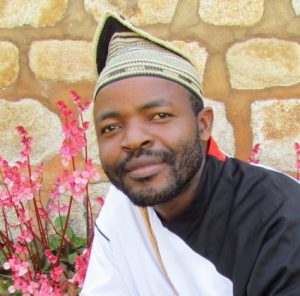
Nelson C. Tschonghongei is the KPAAM-CAM’s Chief Data Manager. He has obtained his PhD degree in Sociolinguistics at the Department of African Languages and Linguistics, University of Yaounde I. Nelson’s full CV.
His dissertation (defended in July 2021) is entitled “Mbuk documentary grammar” and is supervised by prof. Gabriel Mba.
Summary of Nelson C. Tschonghongei’s PhD thesis
Nowadays, in civilised communities, most languages strive to play a dual role; to be spoken and to be read. But they cannot be read when they have not been written down, as well as, they cannot be spoken when there are no speakers. By no speakers, we mean that the natives have abandoned the use of their own language for a language they believe to be superior to theirs; with a more prestigious status acquired in terms of its population, war might or simply because it is having a written form while the neighbouring one does not. The later excuse for inferiority complex is what this research, termed “Mbuk Documentary Grammar” wants to take Mbuk out of. Mbuk should own its own written form of its language as any other language in the world is striving to be spoken, written, and be read.
To attain this goal of having a spoken, a written and a read Mbuk, we used the documentary approach whereby, we collected audio and video recordings from various Mbuk language speakers on varied themes. The data collection was accomplished through research instruments such as observation, documents, interview, and questionnaire in order to obtain the desired findings here stated.
Our findings shows that the natives can now listen to themselves and other speakers through the audio and video recordings. And through the video film there is knowledge sharing throughout all the social classes and gender whenever they are watching the projections. Men and women, children and adults hear and see what they have not been exposed to, thus inviting access rights to be implemented. To get Mbuk read, there are some ELAN annotated media files. There is also the hard copy and an electronic copy of the Mbuk documentary grammar. By documentary here we mean that the descriptive corpus has audiovisual backings available for anyone who wishes to listen or watch them. The corpora includes events of arts and craft, stories, songs, rites, pictures of some items most of which are captured in natural settings. As a complement to the natural scenery are some elicited wordlist, and some grammatical elicitations.
The documentary approach is regarded as a speech community film that cannot go hitch free and as a result requires a policy statement for future research to fill the pitfalls of this present research. As a challenge, the documentary equipments such as recorders, computers, electricity shortage and backup space had been a pendulous bridge that hindered us from going across quickly. Relaunching such a research we should be having better equipments and more field time to explore more diverse themes in order to limit elicitation so as to find enough of what is needed within the naturally occurring speech acts that suit better documentary processes accredited by an appropriate methodology.
You can read Nelson’s final thesis (2021) here.